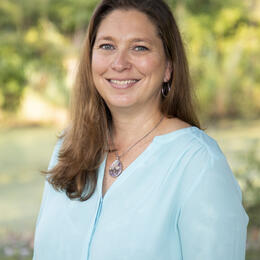(October 31, 2024) -- You cannot beat the fall views in the Great Lakes region with our trees bursting with color as millions of birds fly through, relying on the Great Lakes and the waters that connect to them to make their migration journeys. While beautiful, fall migration is also an important reminder of the significant threats facing birds and our Great Lakes.
One of the biggest challenges is the loss of Great Lakes wetlands habitat from development, climate change and invasive species. Several members of Audubon Great Lakes' staff recently joined hundreds of Great Lakes advocates and environmental leaders in Chicago for the 2024 Great Lakes Conference, put on by the Healing Our Waters Great Lakes Coalition, to highlight challenges facing the Great Lakes and solutions to address them.
Restoring Bird Habitat Thanks to the Great Lakes Restoration Initiative
Stephanie Beilke, Senior Manager of Conservation Science, and Daniel Suarez, Senior Conservation Manager for Audubon Great Lakes, joined partners from the Forest Preserves of Cook County for a presentation on an innovative 3-year long habitat restoration project that restored more than 100 acres of wetlands and reconnected three lakes at Powderhorn Lake Forest Preserve in the Calumet region. The successful restoration will provide the ability to manage water levels and reduce flooding while reestablishing vital marsh habitat that birds, fish and other wildlife need.
This project was made possible thanks to support from the Great Lakes Restoration Initiative. As the largest source of federal funding to protect the Great Lakes, the Great Lakes Restoration Initiative has funded more than 7,000 restoration projects to keep our waters clean and restore our wildlife habitat.
The conference was held as U.S. Congress is considering legislation that would extend the vital restoration program. You can help ensure that important Great Lakes restoration projects continue by asking your Members of Congress to reauthorize funding for this vital program. Take action today.
Protecting Wetlands After Disastrous Supreme Court Decision
We’re also working to pass strong state policies to protect wetlands across the Great Lakes region. During the conference, Brian Vigue, Policy Director of Freshwater for Audubon Great Lakes, was featured on a panel discussion addressing how the Supreme Court’s disastrous decision in Sackett vs. EPA, which overturned federal cleanwater protections, is impacting state wetland protections across our region.
Wetlands can tackle several environmental problems at once – including providing habitat for vulnerable birds and protecting communities from flooding. Earlier this year, Audubon Great Lakes was instrumental in advancing policy in Wisconsin - SB 222, the Pre-Disaster Flood Resilience Grant Program, into law. SB 222 will provide funding to encourage local governments to restore and conserve wetlands and undertake other proactive strategies before flooding events occur – a bipartisan victory for Wisconsin’s wetlands and the birds and communities that depend on them.
This fall, Audubon Great Lakes is mobilizing Audubon members in support of Illinois’ Wetlands Protection Act, which would enact state-level protections for wetlands and waterways left vulnerable by the Supreme Court.
Restoring Bird Habitat in Collaboration with Communities
This important conservation and advocacy work is only possible thanks to engagement from Audubon members and the communities where we work. During the conference, Jennifer Johnson, Wild Indigo Program Associate for Audubon Great Lakes, joined a presentation to discuss our work with conservation and community partners on a major habitat restoration project at Hatcher Park and Marshalltown Marsh in Gary, Indiana.
Hatcher Park and Marshalltown Marsh – comprising 300 acres of valuable yet degraded habitat – represent one of the largest opportunities to restore habitat, protect against floods, provide recreation opportunities for residents, and make Gary more resilient in the face of pollution and climate change. Johnson shared the importance of community engagement, which has already begun and will be emphasized throughout this process to ensure that Gary residents’ voices are heard and that their ideas are incorporated into final designs at the sites.
Daniel Suarez uplifted the importance of working with the community on this project during a presentation on wetlands restoration along the West Branch of the Little Calumet River, which includes our work in Hatcher Park and Mashalltown Marsh.
Audubon and partners have already restored more than 400 acres of wetlands along a ten-mile stretch of the river with support from the Little Calumet River Basin Development Commission. We’re continuing this work at Marshalltown Marsh, where the Little Calumet River runs through in an unnatural straight line, preventing high-quality wetland and marsh habitat from being established.
By restoring Marshalltown Marsh and Hatcher Park, the project will create and improve wetland habitats of the Little Calumet River, create access and recreational opportunities to residents, remove invasive species, and reintroduce native species to make Gary more resilient in the face of pollution and climate change.
“We’re working with the community to understand their needs before restoration begins,” said Suarez. “We hope that they will look and say – this was designed with me in mind.”
Looking Forward
We left the 2024 Great Lakes Conference energized and ready to continue our work to conserve and advance policies that will protect the places our birds and communities need.
Right now, vulnerable wetland species including the Sora, Common Gallinule and Black-Crowned Night Heron are migrating through the Great Lakes region. Together, we can make a safer Great Lakes for them and the communities that depend on them. We invite you to join us in our work. Tell Congress that extending the Great Lakes Restoration Initiative program will make the Great Lakes stronger and more resilient for the birds and communities that depend on them.
-- Marnie Urso, Senior Policy Director of Audubon Great Lakes and Board Member, Healing Our Waters Coalition




